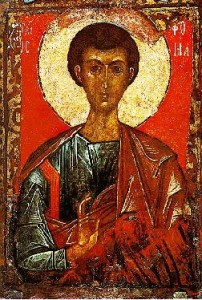The Hymn of the Pearl is a text full of thick illusions and imagery. Most of which can be seen as representatives of other life concepts. This Pearl, the manifestation of Thomas’ goal and desire, the reason he has traveled in the first place, could represent many things; knowledge, faith concepts which are ever near but prove highly allusive to Thomas in his journey. Throughout the hymn there is also mention of a serpent. Immediately this serpent can be linked to Satan, as it was he who was the serpent to tempt Adam and Eve in Genesis 2. This serpent might not be the devil himself, but instead the embodiment of unfaithful temptation. The Old Testament allusions do not end there, there is also mention of holy garments and robes alluding Joseph and his robe of many colors, and there is also much talk of the idea slavery which also alludes to the plight of Joseph and Moses.
Interestingly, this hymn has nothing to do with, nor mentions Jesus and instead follows the apostle Thomas, “which he spake [while] in prison”. Though this hymn is not about Jesus the Christ, we still see the constant usage of language that ushers thoughts about the messiah. Constantly Thomas references his father and his father’s kingdom. It quickly becomes apparent that this father is the king of not a nation or city-state but of the heavens, a divine and uncorruptable ruler. This line of thinking branches away from ‘Jesus is the only son of God’ and falls more in line with all humans are by extension the son of god, and also denotes Thomas’ close relationship to God.
This hymn is also a commentary on the unholiness of the human domain. We read that Thomas rids himself of “their filthy garments” and leaves it in their country (XIII). This line of thinking is not a new one but has very old origins linked to the Greek past. Human realms are innately flawed like all people and with these flaws are often tyrannical or host tyrannical rulers. The only unflawed kingdom is the kingdom of heaven which god rules. The Hellenes also had a concept dating back to their myth of the Trojan wars that the East would always be at conflict with the peoples of the west. Thomas knows this conflict well becoming imprisoned in an Indian jail. This hymn is set on an international scene with many of its characters being of this tyrannical eastern states, but even still Thomas calls his mother “the Queen of Dawn-land” and the “East-Queen”. This denotes that even the east and all its hostility still has a connection with the west.

